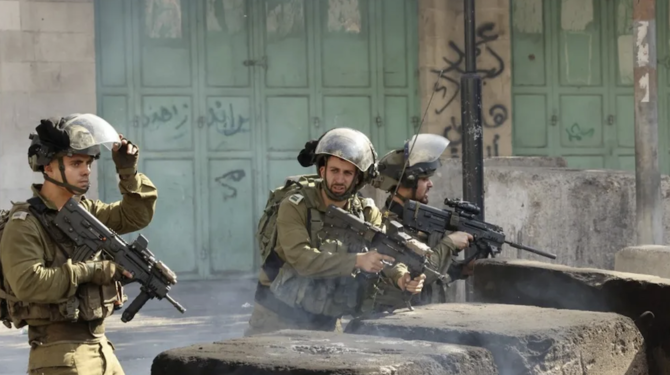RAMALLAH: A year after conducting the wide-scale military operation in the West Bank “Break the Wave,” the Israeli security apparatus seems to have achieved little. The situation is more dangerous and violent than before the operation, defense experts told Arab News.
The operation started in February 2022 with the assassination of three Palestinians in Nablus — Adham Mabrouka, Ashraf Mubaslat, and Mohammed Dakhil — and continued with terrible violence, spreading into Gaza.
The Israeli campaign of arrests disrupted the lives of more than 7,000 Palestinians from the West Bank and Jerusalem. A total of 139 Palestinians were killed and thousands were injured, while dozens of homes were destroyed. However, the campaign failed to eliminate perpetrators of individual attacks.
Israeli military experts say the West Bank was the only front where Israel could have achieved victory. The same could not be said about its confrontations with Lebanese Hezbollah, Gaza rulers Hamas, or Iran. But a year later, the West Bank has become the biggest security challenge for the Israeli army, following the Iranian threat, as it deployed 46 divisions there — 80 percent of its total military strength.
The operation tried to achieve three goals:
i) To thwart individual or organized Palestinian attacks before they occur, which requires accurate intelligence but was not achieved due to the escalation of individual attacks and the expansion of armed groups across the West Bank.
ii) To achieve deterrence through security operations by arresting everyone related to the perpetrators or planners of attacks, demolishing their homes and deporting their families.
iii) To address weaknesses in the segregation wall between Israel and the West Bank, which enables armed attackers and other Palestinians to breach the barrier.
Since the beginning of 2023, the death toll of Israeli soldiers and settlers has risen to 15 — almost half of the 33 deaths in Israel during the entire year of 2022.
Esmat Mansour, a Palestinian expert on Israeli affairs, told Arab News that the Israeli military operation failed to achieve the objectives it set out to accomplish a year ago.
It also failed to eliminate Palestinian military groups, prevent armed attacks against Israeli targets, and transfer Israeli-Palestinian confrontation to the West Bank, as former Israeli Defense Minister Benny Gantz said he preferred a military confrontation between a Palestinian gunman and an Israeli soldier in Jenin instead of a coffee shop in Tel Aviv.
Mansour said that security coordination between Israel and the Palestinian Authority had stopped and that Israel’s control over the security situation in the West Bank had diminished.
“I believe that the Israeli operation has failed to achieve the goals for which it was launched and that the presence of an extreme right-wing government compounds the failure of the military operation and may lead to the start of a third intifada,” Mansour said.
The escalation of Palestinian attacks and the expansion of Palestinian cells — whether through the Lions’ Den, the Jenin Brigade, the Jerusalem Brigades, the Al-Qassam Brigades, the Al-Aqsa Martyrs Brigades, the Tulkarem Brigade or the Jab’a Brigade —constituted a blow to the Israeli security system.
A year on, the army, Israel’s internal spy network Shin Bet and the police hop from one plan to another, while Palestinian resistance groups, previously confined to Jenin and now present in Nablus, Jericho and Tulkarem, have increased.
Meanwhile, to contain growing Palestinian military attacks against the Israeli targets, the US, Jordan and Egypt attended a summit in Aqaba, Jordan, on Feb. 26 with the participation of the Palestinian Authority.
While the summit was in progress, a Palestinian shot dead two Israeli settlers near Nablus. Later in the evening, hundreds of extremist settlers raided Hawara town and launched arson attacks with impunity, targeting civilian houses and cars.


























